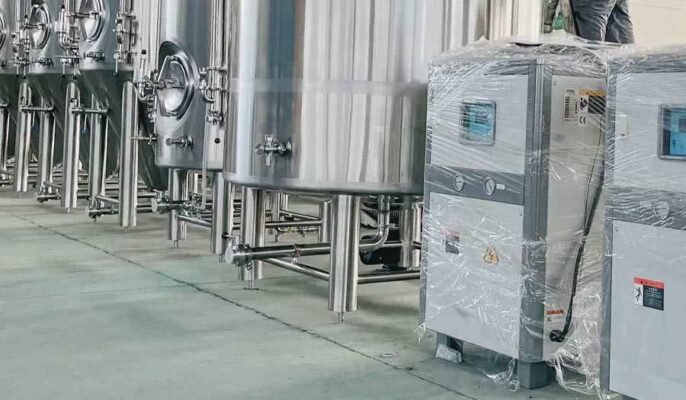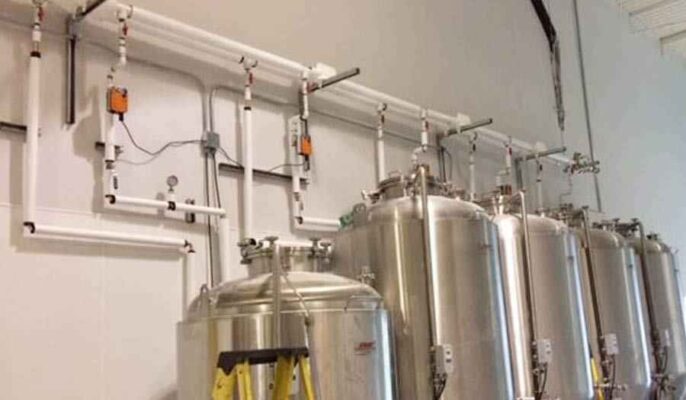Cooling and glycol systems are the most important pieces of equipment in a brewery. Although grinding, mashing, filtering and boiling are difficult to link with cooling systems, the heat in these processes is carried away by coolers. Without proper cooling, beer can be spoiled, resulting in off-flavors, a cloudy appearance, and other imperfections. This article will explain the importance of cooling and glycol systems.
Cooling system type
Direct Expansion (DX) Cooling System
This system uses a refrigerant that circulates through a heat exchanger to cool the beer. The refrigerant absorbs heat from the beer and transfers it to the surrounding air or water. The system is cost-effective and easy to maintain, but less efficient for large breweries.

Glycol Cooling System
The system uses a mixture of water and glycol to circulate through a network of pipes to cool the beer. The glycol solution absorbs heat from the beer and transfers it to a heat exchanger where it is cooled by the refrigerant. The system is more efficient cooling than the DX and can handle larger breweries.
Air cooling system
This system uses ambient air to cool the beer. The beer circulates through a heat exchanger, and the surrounding air cools the beer. The system is simple and cost-effective, but may be less efficient than glycol cooling in hot and humid environments.
What is a Glycol System? what’s the effect?
A glycol cooler is a compact refrigeration unit designed to cool beer and maintain the desired temperature as the beer travels through the beer line from the walk-in cooler to the draft beer tower.
The glycol cooler is one of the main components of Changdrink draft beer dispensing system.
As a substance, ethylene glycol is an antifreeze. It is important to distinguish between ethylene glycol (used in cars) and propylene glycol, which is used in the food industry because it is completely non-toxic. This is why ethylene glycol is used in coolers.
Pure propylene glycol has a freezing point of -59°C (-74,2 °F), making it an ideal coolant. You can change this temperature by mixing glycol with water. For most applications, the ideal ratio of propylene glycol to water is 35% – 40%.
Inside the glycol cooler, glycol is used as a coolant to ensure that the beer is kept cold and does not get hot as the beer travels from the keg in the walk-in cooler through the beer line to the draft beer tower.
Why does beer use glycol system?
- Allows you to ship beer over long distances (up to 450 feet)
- You can provide more beer towers with different designs
- Cut your pouring costs
Let’s say you’re choosing to use glycol and some other coolant for your system. In this case, we definitely recommend using ethylene glycol, as it helps increase the efficiency of the chiller, prolongs its lifespan, and reduces vibration and noise levels.
Wort Cooler and Glycol
Cold liquid tank (CLT) and single stage wort heat exchanger
CLTs are stainless steel storage tanks with air conditioning jackets or external heat exchangers. The CLT is filled with water and is cooled to a temperature level of around 35 F between development cycles. This cooling water is then pumped in a 1:1 ratio together with the wort exchanger to cool the wort from its boiling temperature level to its preferred fermentation temperature level.
Two-stage cooling using tap water and cooling glycol
Step One: Use city water in a 1:1 ratio to remove as much heat as possible. Depending on the efficiency of the heat exchanger, the wort will leave the first stage with an incoming water temperature in the range of 7-10 F.
Step Two: Transfer remaining heat to chilled glycol and exit at desired fermentation temperature.
This heating load is enormous compared to the other cooling loads served by the chiller system. this requires breweries to isolate their wine cellars from the cooling circuit, so all available cooling capacity of the chiller system is dedicated to that single process.

Pre-cooling of tap water before entering the single-stage wort temperature exchanger
This is an excellent mark-down option for breweries that experience seasonal peaks in urban water temperature levels, but have the ability to cool poured wort for the rest of the year. The disadvantage of using cheap brazed plate stainless steel heat exchangers is that these bonded heat exchangers cannot be opened, and if they become contaminated or connected, they usually need to be replaced with new ones.
Are there any disadvantages to using ethylene glycol in a chiller?
Some things must be paid attention to when using ethylene glycol:
- You must maintain the proper temperature range and glycol/water ratio, otherwise the glycol in the system may freeze
- Ethylene glycolmay be flammable, so all safety precautions of the manufacturer/seller must be followed when using
- Ethylene glycol is more expensive than other coolants
Ethylene glycol and product packaging
Since bottling and canning lines can be very finicky, it is possible to install plate heat exchangers in bottling/canning lines. Any heat absorbed during transfer from the beer tank is removed, ensuring a steady flow of beer at a constant temperature.
Cold area air conditioners using cooling glycol are becoming more common than standard direct coolant based systems. The advantages are reduced installation costs, simplified controls and procedures, and no need for more refrigeration systems. Cooled glycol requires more coil surface area because glycol coil temperature levels are higher than typical coolant coil temperature levels.
We use a program to simulate tons of reefer cooling created by reefer manufacturers. For the calculation, we take measurements of the space, including the ceiling level, and whether the plot “holds” items at temperature levels or needs to “take” items down and the aspect ratio also needs to be taken into account. The refrigerator system is one of the most important beer equipment in a brewery. It is valued because of the huge role it plays in the development process.




